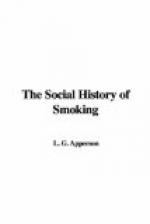Among the many medicinal virtues attributed to tobacco was its supposed value as a preservative from contagion at times of plague. Hearne, the antiquary, writing early in 1721, said that he had been told that in the Great Plague of London of 1665 none of those who kept tobacconists’ shops suffered from it, and this belief no doubt enhanced the medical reputation of the weed. I have also seen it stated that during the cholera epidemics of 1831, 1849, and 1866 not one London tobacconist died from that disease; but good authority for the statement seems to be lacking. Hutton, in his “History of Derby,” says that when that town was visited by the plague in 1665, that at the “Headless-cross ... the market-people, having their mouths primed with tobacco as a preservative, brought their provisions.... It was observed, that this cruel affliction never attempted the premises of a tobacconist, a tanner or a shoemaker.” Whatever ground there may have been for the belief in the prophylactic effect of smoking, there can be no doubt that in the seventeenth century it was firmly held. Howell in one of his “Familiar Letters” dated January 1, 1646, says that the smoke of tobacco is “one of the wholesomest sents that is against all contagious airs, for it overmasters all other smells, as King James they say found true, when being once a hunting, a showr of rain drave him into a Pigsty for shelter, wher he caus’d a pipe full to Be taken of purpose.” But here Mr. Howell is certainly drawing the long-bow. One cannot imagine the author of the “Counterblaste” countenancing the use of tobacco under any circumstances.
At the time of the Great Plague all kinds of nostrums were sold and recommended as preservatives or as cures. Most of these perished with the occasion that called them forth; but the names of some have been preserved in a rare quarto tract which was published in the Plague year, 1665, entitled “A Brief Treatise of the Nature, Causes, Signes, Preservation from and Cure of the Pestilence,” “collected by W. Kemp, Mr. of Arts.” In the list of devices for purifying infected air it is stated that “The American Silver-weed, or Tobacco, is very excellent for this purpose, and an excellent defence against bad air, being smoked in a pipe, either by itself, or with Nutmegs shred, and Rew Seeds mixed with it, especially if it be nosed”—which, I suppose, means if the smoke be exhaled through the nose—“for it cleanseth the air, and choaketh, suppresseth and disperseth any venomous vapour.” Mr. Kemp warms to his subject and proceeds with a whole-hearted panegyric that must be quoted in full: “It hath singular and contrary effects, it is good to warm one being cold, and will cool one being hot. All ages, all Sexes, all Constitutions, Young and Old, Men and Women, the Sanguine, the Cholerick, the Melancholy, the phlegmatick, take it without any manifest inconvenience, it quencheth thirst, and yet will make one more able, and fit to drink; it abates hunger, and yet will get




